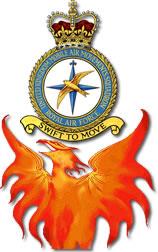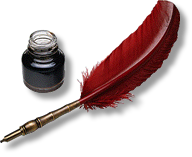

London, ON
8th December 2000
8th December 2000
Chipping ice seems to be occupying some of my time each morning nowadays. I understand in the dear old UK there are still torrential downpours of rain everywhere. I have a nice little application on my computer called 'Wetsocks' where I can get instant weather listings for up to 12 cities. It's not important - just conversation...
On to OBA biz...
On to OBA biz...
We welcome Jerry Allen from Cheltenham. Jerry also provided us with a little seasonal something for the humour page - well worth a visit!
After I came across David Howley's name in a Search Engine, I invited him to join the OBA. He writes to us from Bexleyheath:
03 Decmember 2000
Hi Tony,
Looking through the names it really is an Old Boy's list - some well known, others familiar and some that I don't remember at all. Still I only had one tour on UKMAMS and that was on base - Myself, Colin Allen, Stu Whitham (Nev's brother) and Mark ???? counting pallets in 1976-78.
Currently I am at 172 Bedonwell Road, Bexleyheath, Kent, DA7 5PX, 01322-408584 but now that Claire has retired we hope to move next year (to a less polluted area).
Great to hear from you, thanks for the contact, add me to the list and I will pop-in from time to time.
Best Wishes
David.
03 Decmember 2000
Hi Tony,
Looking through the names it really is an Old Boy's list - some well known, others familiar and some that I don't remember at all. Still I only had one tour on UKMAMS and that was on base - Myself, Colin Allen, Stu Whitham (Nev's brother) and Mark ???? counting pallets in 1976-78.
Currently I am at 172 Bedonwell Road, Bexleyheath, Kent, DA7 5PX, 01322-408584 but now that Claire has retired we hope to move next year (to a less polluted area).
Great to hear from you, thanks for the contact, add me to the list and I will pop-in from time to time.
Best Wishes
David.
Also found in that search was Peter Marsh from Southampton, and we welcome him to the OBA
Yet another Old Boy was turned up, this time in the Middle East. Dave Webb writes to us from Abu Dhabi in the United Arab Emirates:
1st December 2000
Good Evening Tony,
Many thanks for your email. Yes, I will certainly join as after serving in Air Movements in Labuan, Changi, Brize Norton, Akrotiri and for 12 years with the Sultan of Oman's Air Force, I guess I qualify.
I shall pass your message on to Chris Higham and John I'Anson who are also out here in the UAE, like myself still serving, but now with the UAE Air Force and Air Defence.
I have been unable to thoroughly access your web site as we have some local problems with the internet at present here in Abu Dhabi, but shall certainly do so at my first opportunity.
Kindest Regards,
Dave Webb
~~~~~~~~~~~~~~~~~~~
Welcome to the OBA Dave!
1st December 2000
Good Evening Tony,
Many thanks for your email. Yes, I will certainly join as after serving in Air Movements in Labuan, Changi, Brize Norton, Akrotiri and for 12 years with the Sultan of Oman's Air Force, I guess I qualify.
I shall pass your message on to Chris Higham and John I'Anson who are also out here in the UAE, like myself still serving, but now with the UAE Air Force and Air Defence.
I have been unable to thoroughly access your web site as we have some local problems with the internet at present here in Abu Dhabi, but shall certainly do so at my first opportunity.
Kindest Regards,
Dave Webb
~~~~~~~~~~~~~~~~~~~
Welcome to the OBA Dave!
Basil Hughes might be one of the original MAMS Commandos...
Pembrokeshire
1st December 2000
Dear Tony,
How old is MAMS ?
I ask this question because although I belonged to the old MAMS flight at RAF Abingdon, I never knew when the flight had been founded.
The story about Salalah brought back memories for me. In 1957 I was an SAC Air Movs at RAF Wildenrath in Germany. One day six of us were detailed to go on detatchment to the Middle East. We were sent down to Sick Quarters and received two jabs in each arm and others elsewere, were kitted out, and the next morning we were on the train for UK.
We were flown out to Aden in a Hermes aircraft and two of us continued up to Sharjah by Beverley. In Sharjah we were on active service, and the runway had to be inspected for land mines every day.
The airfield was fully operational; we had Shackletons with 1000 lb bombs and Venoms, there was also a Pembroke. The runways were sand, and there was sand everywhere. Water was rationed; when you got your daily bottle it had a film of oil on the top and a half an inch of sand in the bottom!
I had a terrible toothache, but the nearest dentist was in Aden. I was given the option of having the doctor take it out - he said he had done one extraction in medical school - or go to the local dentist in downtown Sharjah. I went downtown. I was shown into a room which had a stool in the centre and people hunched down around the walls. There was a man on the stool with another another holding his shoulders and a man with a pair of what looked like a huge waterpump pliers! It's quite suprizing how quickly a toothache goes! I was shown into another room were there was a fully equiped dental surgery and had my tooth extracted.
I could write a book about what happened there, but will leave that for another day. I was there for six months and my weight when I left was just over 7 stone and was on sick leave for over two months. I returned to Wildenrath and was then detached to Hamburg on Mobile Air Movements duties doing squadron moves at Sylt and Jever for a 18 months.
Basil Hughes
(In a very wet and windy Pembrokeshire)
Pembrokeshire
1st December 2000
Dear Tony,
How old is MAMS ?
I ask this question because although I belonged to the old MAMS flight at RAF Abingdon, I never knew when the flight had been founded.
The story about Salalah brought back memories for me. In 1957 I was an SAC Air Movs at RAF Wildenrath in Germany. One day six of us were detailed to go on detatchment to the Middle East. We were sent down to Sick Quarters and received two jabs in each arm and others elsewere, were kitted out, and the next morning we were on the train for UK.
We were flown out to Aden in a Hermes aircraft and two of us continued up to Sharjah by Beverley. In Sharjah we were on active service, and the runway had to be inspected for land mines every day.
The airfield was fully operational; we had Shackletons with 1000 lb bombs and Venoms, there was also a Pembroke. The runways were sand, and there was sand everywhere. Water was rationed; when you got your daily bottle it had a film of oil on the top and a half an inch of sand in the bottom!
I had a terrible toothache, but the nearest dentist was in Aden. I was given the option of having the doctor take it out - he said he had done one extraction in medical school - or go to the local dentist in downtown Sharjah. I went downtown. I was shown into a room which had a stool in the centre and people hunched down around the walls. There was a man on the stool with another another holding his shoulders and a man with a pair of what looked like a huge waterpump pliers! It's quite suprizing how quickly a toothache goes! I was shown into another room were there was a fully equiped dental surgery and had my tooth extracted.
I could write a book about what happened there, but will leave that for another day. I was there for six months and my weight when I left was just over 7 stone and was on sick leave for over two months. I returned to Wildenrath and was then detached to Hamburg on Mobile Air Movements duties doing squadron moves at Sylt and Jever for a 18 months.
Basil Hughes
(In a very wet and windy Pembrokeshire)
London, Canada
1st December 2000
Dear Basil,
Thanks for your e-mail asking the question "How Old Is MAMS?"
The information I have on hand is probably very accurate, but if anyone else has knowledge about the origins of the squadron that differ please share it with us:
The history of UKMAMS dates from July 1958 when the first Mobile Air Movements Section was deployed from RAF Abingdon to cover the move of British Forces into Jordan at the time of the Iraq revolution.
Subsequently, the section grew with the increasing size and number of transport aircraft, and with the evolution of the Defense Policy requirement for mobility.
Squadron status was granted on 1st May 1966, and UKMAMS became an independent unit operationally controlled by Air Support Command and administratively controlled by RAF Abingdon.
In 1974 UKMAMS relocated from Abingdon to RAF Lyneham and amalgamated with the existing Station Movements Squadron to provide a dual Base and Mobile capability.
I trust this answers your question. Of course, unofficially, you might have been one of the first MAMS Commandos - it's just that no one knew that at the time!
Best regards
Tony
1st December 2000
Dear Basil,
Thanks for your e-mail asking the question "How Old Is MAMS?"
The information I have on hand is probably very accurate, but if anyone else has knowledge about the origins of the squadron that differ please share it with us:
The history of UKMAMS dates from July 1958 when the first Mobile Air Movements Section was deployed from RAF Abingdon to cover the move of British Forces into Jordan at the time of the Iraq revolution.
Subsequently, the section grew with the increasing size and number of transport aircraft, and with the evolution of the Defense Policy requirement for mobility.
Squadron status was granted on 1st May 1966, and UKMAMS became an independent unit operationally controlled by Air Support Command and administratively controlled by RAF Abingdon.
In 1974 UKMAMS relocated from Abingdon to RAF Lyneham and amalgamated with the existing Station Movements Squadron to provide a dual Base and Mobile capability.
I trust this answers your question. Of course, unofficially, you might have been one of the first MAMS Commandos - it's just that no one knew that at the time!
Best regards
Tony
Pembrokeshire
2nd Decmeber 2000
Dear Tony,
It was interesting that you should mention the first unofficial MAMS Commandos. I know that on the aircraft going out to the Middle East, besides the 6 from Air Movements Wildenrath, there were some from Air Movements Abingdon, and I believe one from Northolt. We were split between Kormaksar, Salalah, Masirah, Sharjah and I think later Bahrain. We were operational, on active service, and recieved the GSM with the Trucial Oman States clasp.
I think it was about April 1957 that we went. I returned in October 1957 through Bahrain.
At Khormaksar I believe they were involved mainly in moving the army, including those gentlemen from Hereford, up country, using mainly Beverleys. Besides resupply for Sharjah, which had been a very small unit, we were involved in loading equipment to build a forward airfield, and handling large quantities of munitions for the half squadron of Shackletons and Venoms based there. We also handled some of the captured arms - museum quality. This was my first experience of handling bodies, acquiring coffins, and loading them onto the aircraft.
On my return, as soon as I came off sick leave, I was notified that I had been promoted to local acting (paid) Corporal. I was then sent, on my own, to Hamburg, based at the RTO but on Air Movement duties, living just two minutes walk from the Reepabahn!
I don't know it there any other members who remember that time? Would it have been because of that campaign that MAMS was formed?
Regards
Basil
2nd Decmeber 2000
Dear Tony,
It was interesting that you should mention the first unofficial MAMS Commandos. I know that on the aircraft going out to the Middle East, besides the 6 from Air Movements Wildenrath, there were some from Air Movements Abingdon, and I believe one from Northolt. We were split between Kormaksar, Salalah, Masirah, Sharjah and I think later Bahrain. We were operational, on active service, and recieved the GSM with the Trucial Oman States clasp.
I think it was about April 1957 that we went. I returned in October 1957 through Bahrain.
At Khormaksar I believe they were involved mainly in moving the army, including those gentlemen from Hereford, up country, using mainly Beverleys. Besides resupply for Sharjah, which had been a very small unit, we were involved in loading equipment to build a forward airfield, and handling large quantities of munitions for the half squadron of Shackletons and Venoms based there. We also handled some of the captured arms - museum quality. This was my first experience of handling bodies, acquiring coffins, and loading them onto the aircraft.
On my return, as soon as I came off sick leave, I was notified that I had been promoted to local acting (paid) Corporal. I was then sent, on my own, to Hamburg, based at the RTO but on Air Movement duties, living just two minutes walk from the Reepabahn!
I don't know it there any other members who remember that time? Would it have been because of that campaign that MAMS was formed?
Regards
Basil
Arfur English over at Crab Air wrote to me regarding a recent article:
Shamrockville
December 1st, 2000
Hi Tony,
Read your article "To Tip Or Not"
Well, being a Mover for some 20 years now with three tours at Brize Norton under my black belt, the "techies" always said "Movers will tip a VC10 one day"
God how I larfed my arse off, or to quote web speak "ROFLMAO", when circa '99 the highly trained, highly paid, nose in book brigade of technicians put XV106 on her ass at Brize... many a tear was shed at 0400 on a winters morning doing the Wildenrath-Deci shed and XV106 was one of those frames to be used..
The Americans would be proud to pull wheelies like that in a dragster, let alone an aircraft. The picture was taken with the VC10 trying a lunar launch, around 45-50 degrees nose up off the deck!
Techies 1- Movers 0... in the tipping stakes I guess...
Eye-opening stuff for thoses new Movers who wonder what a VC10 will look like if we dont follow the rules to the letter..
Rgds for now...
Arfur @ Crab Air
Shamrockville
December 1st, 2000
Hi Tony,
Read your article "To Tip Or Not"
Well, being a Mover for some 20 years now with three tours at Brize Norton under my black belt, the "techies" always said "Movers will tip a VC10 one day"
God how I larfed my arse off, or to quote web speak "ROFLMAO", when circa '99 the highly trained, highly paid, nose in book brigade of technicians put XV106 on her ass at Brize... many a tear was shed at 0400 on a winters morning doing the Wildenrath-Deci shed and XV106 was one of those frames to be used..
The Americans would be proud to pull wheelies like that in a dragster, let alone an aircraft. The picture was taken with the VC10 trying a lunar launch, around 45-50 degrees nose up off the deck!
Techies 1- Movers 0... in the tipping stakes I guess...
Eye-opening stuff for thoses new Movers who wonder what a VC10 will look like if we dont follow the rules to the letter..
Rgds for now...
Arfur @ Crab Air
London, Canada
1st December 2000
Dear Arfur,
Well, I guess it's Movers 1 : Techies 1
Back in 1971 I was in Lima, Peru, bringing in relief supplies just after the earthquake. We arrived on a Brit with a dead donkey - lost it over Panama - and so we were on the ground for about 10 days waiting for a replacement to arrive.
Anyway, we were offloading a rather large piece of prefabricated concrete from a Herc, I think it weighed 12,000 lbs, and the ground handling equipment was totally inadequate for this cargo. We had to slide the piece out, on the rollers, so that there was about 5' hanging clear of the ramp. We positioned two tiny forklifts, one on either side of the ramp, and started to lower the ramp so that the forklifts could take the weight.
Big mistake! The nose wheels of the Herc came about 7' off of the ground and it took 12 locals jumping up and down on the flight deck to get it level again! We put the anti-tip strut in 'tout de suite!'
Naturally we had to re-think our strategy for that one, and I honestly forget how we finally managed to get it off.
I don't think that the Herc was damaged because it appeared to take off and fly o.k the following morning (hearts in mouths time!).
Regards
Tony
1st December 2000
Dear Arfur,
Well, I guess it's Movers 1 : Techies 1
Back in 1971 I was in Lima, Peru, bringing in relief supplies just after the earthquake. We arrived on a Brit with a dead donkey - lost it over Panama - and so we were on the ground for about 10 days waiting for a replacement to arrive.
Anyway, we were offloading a rather large piece of prefabricated concrete from a Herc, I think it weighed 12,000 lbs, and the ground handling equipment was totally inadequate for this cargo. We had to slide the piece out, on the rollers, so that there was about 5' hanging clear of the ramp. We positioned two tiny forklifts, one on either side of the ramp, and started to lower the ramp so that the forklifts could take the weight.
Big mistake! The nose wheels of the Herc came about 7' off of the ground and it took 12 locals jumping up and down on the flight deck to get it level again! We put the anti-tip strut in 'tout de suite!'
Naturally we had to re-think our strategy for that one, and I honestly forget how we finally managed to get it off.
I don't think that the Herc was damaged because it appeared to take off and fly o.k the following morning (hearts in mouths time!).
Regards
Tony
I have been doing a little research about Aden, and in particular Khormaksar, for an upcoming article, and had been corresponding with a former 'inmate' of that infamous port city. Here is an extract from one of the e-mails:
"Coincidence that you should have been at Salalah when I was at Khormaksar. I seem to remember about a dozen chaps being killed in a bomb attack at the open air cinema there. I think it was early '67 but may have been late '66. We had to send a 84 (Scorpiones Pungunt) Beverley up country with some of the "local police," can't remember what their proper official title was. They were going to bring some prisoners back who were believed to be the terrorists responsible for the outrage. When the aircraft landed on its return to Khormaksar the crew were visibly shaken, and there were no prisoners. The crew had heard a noise like the boom exit door for paratroopers being slammed closed, and the prisoners had apparently been tossed out over the coast from a height of about 9,000 feet. Apparently the AQM had been the first to hear a noise up the back and had been shooed away by the "police" when he went to investigate. I never saw an official report or even a report in the local Aden newspaper called The Dhow. You probably know that execution by throwing the convicted one from the highest point of the local Sheikh's "palace", was the next best thing to the sword and beheading. I have seen reports in The Dhow that would beggar belief in western society, about executions and amputations throughout the Arabian Peninsula."
"Coincidence that you should have been at Salalah when I was at Khormaksar. I seem to remember about a dozen chaps being killed in a bomb attack at the open air cinema there. I think it was early '67 but may have been late '66. We had to send a 84 (Scorpiones Pungunt) Beverley up country with some of the "local police," can't remember what their proper official title was. They were going to bring some prisoners back who were believed to be the terrorists responsible for the outrage. When the aircraft landed on its return to Khormaksar the crew were visibly shaken, and there were no prisoners. The crew had heard a noise like the boom exit door for paratroopers being slammed closed, and the prisoners had apparently been tossed out over the coast from a height of about 9,000 feet. Apparently the AQM had been the first to hear a noise up the back and had been shooed away by the "police" when he went to investigate. I never saw an official report or even a report in the local Aden newspaper called The Dhow. You probably know that execution by throwing the convicted one from the highest point of the local Sheikh's "palace", was the next best thing to the sword and beheading. I have seen reports in The Dhow that would beggar belief in western society, about executions and amputations throughout the Arabian Peninsula."
Also during the research I found the following 3 year old report, but very interesting nonetheless:
Aden Then and Now by Brian Barron BBC News On Line December 3, 1997
Thirty years ago this week [Editors note - make that 33 years ago], the last British forces in Aden abandoned Britain's Middle East headquarters and the territory became independent, as South Yemen. The two-year independence struggle in Britain's only Arabian colony cost hundreds of British and Arab lives. But many more people were to meet a violent end in the years which lay ahead. Brian Barron, who was the BBC's last correspondent in Aden, has just been back, and says the British withdrawal was one of the country's shabbiest retreats from colonialism.
There can be few more evocative names than Steamer Point. Here for well over a hundred years the world's shipping - from rusting old tubs to the sleekest liners afloat - put in for fuel. Aden is just four miles off the busiest east-west trade route. Once it welcomed more ships than Singapore or Rotterdam. Generations of sailors, among them Joseph Conrad, have come ashore at Prince of Wales pier in the shadow of Little Ben, a colonial clocktower that today has fallen on hard times. Beside the tower and its clock-face without hands is a ruined house, pockmarked with bullet and shell holes, a reminder of the half a dozen civil wars that have punctuated thirty
violent years of independence.
Aden Then and Now by Brian Barron BBC News On Line December 3, 1997
Thirty years ago this week [Editors note - make that 33 years ago], the last British forces in Aden abandoned Britain's Middle East headquarters and the territory became independent, as South Yemen. The two-year independence struggle in Britain's only Arabian colony cost hundreds of British and Arab lives. But many more people were to meet a violent end in the years which lay ahead. Brian Barron, who was the BBC's last correspondent in Aden, has just been back, and says the British withdrawal was one of the country's shabbiest retreats from colonialism.
There can be few more evocative names than Steamer Point. Here for well over a hundred years the world's shipping - from rusting old tubs to the sleekest liners afloat - put in for fuel. Aden is just four miles off the busiest east-west trade route. Once it welcomed more ships than Singapore or Rotterdam. Generations of sailors, among them Joseph Conrad, have come ashore at Prince of Wales pier in the shadow of Little Ben, a colonial clocktower that today has fallen on hard times. Beside the tower and its clock-face without hands is a ruined house, pockmarked with bullet and shell holes, a reminder of the half a dozen civil wars that have punctuated thirty
violent years of independence.
The back streets of Steamer Point are choked with hundreds of tons of uncollected rubbish - for Aden's goats, it is paradise. The souvenir shops that once prospered from steamship passengers are barred and shuttered. Only the Aziz bookshop is open. Mr Aziz, calm and collected in late middle age, sits in the doorway clutching a large radio tuned to BBC World Service. "All the other shopkeepers have gone," says Mr Aziz. "They left because of the troubles. Because very few ships come here. They've gone back to India and Pakistan and the Gulf."
A mile away is Mallaa Main Street dubbed by Fleet Street headline writers in the 60s as Murder Mile. Often the Arab nationalists in the independence struggle didn't differentiate between soldiers and civilians. One of my friends, a young English civil servant at the start of his career was shot in the back getting into his car. What a waste. What a pointless action. To be fair, the British forces were not paragons either.
One steamy morning in the Crater district I arrived to find Colonel Colin Mitchell - known to the media as Mad Mitch because of his gungho style - directing a group of squaddies who were stacking, like a butcher's delivery, the corpses of six Arabs on the pavement. They'd been shot as they tried to ambush a patrol. "It was like shooting grouse," said the Colonel. "A brace here and a brace there. It was over in seconds."
A totally different version of such tragedies is displayed in Aden's Military Museum. Scattered throughout the dusty rooms are clapped out bits of military hardware from the independence struggle and oil paintings depicting British brutality. The faded black-and-white photos of the stalwarts of the uprising, all in their twenties, all members of the NLF, the National Liberation Front, are the images of dead men.
A mile away is Mallaa Main Street dubbed by Fleet Street headline writers in the 60s as Murder Mile. Often the Arab nationalists in the independence struggle didn't differentiate between soldiers and civilians. One of my friends, a young English civil servant at the start of his career was shot in the back getting into his car. What a waste. What a pointless action. To be fair, the British forces were not paragons either.
One steamy morning in the Crater district I arrived to find Colonel Colin Mitchell - known to the media as Mad Mitch because of his gungho style - directing a group of squaddies who were stacking, like a butcher's delivery, the corpses of six Arabs on the pavement. They'd been shot as they tried to ambush a patrol. "It was like shooting grouse," said the Colonel. "A brace here and a brace there. It was over in seconds."
A totally different version of such tragedies is displayed in Aden's Military Museum. Scattered throughout the dusty rooms are clapped out bits of military hardware from the independence struggle and oil paintings depicting British brutality. The faded black-and-white photos of the stalwarts of the uprising, all in their twenties, all members of the NLF, the National Liberation Front, are the images of dead men.
Thirty years ago I watched them disembark at Khormaksar airbase just hours after the last British forces had left by helicopter. The NLF leadership had flown in to inherit their kingdom. Little was known about them except that they were Arabs from outlying provinces who'd been trained by George Habash and other Palestinian radicals in Lebanon.
Within minutes the new regime was talking about scientific socialism. Soon we realised that Britain's blunders had ushered in the Arab world's first Marxist state named the People's Democratic Republic of South Yemen. For a while the comrades were hailed as liberators. In fact, they'd liquidated the only other Arab faction which posed a threat. In the two decades that followed they fell out and murdered each other one by one - a classic example of a revolution devouring its children.
With such a burden of recent history you might think that Aden would have had enough. A new course would be in order. In fact they have tried but with only mixed results.
The opportunity came when the Soviet Union collapsed. Moscow had turned South Yemen into a client state. When the roubles ran out the handful of surviving Aden revolutionaries were bankrupt and friendless. They sold their country's independence to their cousins across the border in North Yemen; the two countries were united as the Yemen Republic. It was an unequal alliance because there are six times more northerners than southerners. Three years ago the unhappy south tried to secede and civil war was the result. After besieging Aden the northerners finally won.
Within minutes the new regime was talking about scientific socialism. Soon we realised that Britain's blunders had ushered in the Arab world's first Marxist state named the People's Democratic Republic of South Yemen. For a while the comrades were hailed as liberators. In fact, they'd liquidated the only other Arab faction which posed a threat. In the two decades that followed they fell out and murdered each other one by one - a classic example of a revolution devouring its children.
With such a burden of recent history you might think that Aden would have had enough. A new course would be in order. In fact they have tried but with only mixed results.
The opportunity came when the Soviet Union collapsed. Moscow had turned South Yemen into a client state. When the roubles ran out the handful of surviving Aden revolutionaries were bankrupt and friendless. They sold their country's independence to their cousins across the border in North Yemen; the two countries were united as the Yemen Republic. It was an unequal alliance because there are six times more northerners than southerners. Three years ago the unhappy south tried to secede and civil war was the result. After besieging Aden the northerners finally won.
Today Adenis seem sullen. One Arab journalist told me: "This is not unity it's occupation. There is an incredible amount of resentment against northerners who've come down here and bought up prime buildings and commandeered what they want." He finished with a warning: "If nothing is done there's going to be an explosion." And explosions there have been in recent weeks: a series of bomb blasts blamed on southern dissidents. The secret police have rounded up scores of suspects.
Beneath the towering dark red walls of an extinct volcano nestles the Crater district. Bored men sit and squat in doorways. Women swaddled in black veils hurry past. Islam is ascendant, Marxism reviled. Apart from the soaring chorus of the calls to prayers five times a day, not much is going on here. Unemployment could be 70%. For decades the communist authorities bought the acquiescence of the people by employing them in a vast, Soviet-style bureaucracy. Private enterprise was banned. Now work is hard to find.
The one glimmer of hope is a major project to redevelop Aden Port with international help. It has become the forgotten destination of the seven seas.
Today, older Adenis look back on British rule with affection. The failure to provide durable institutions, the ugliness of the last two years of Pax Britannica, the indecent haste of the evacuation, all are excused or forgotten. No doubt 23 years of murder and tyranny, followed by seven years of tension and another civil war, are enough to gild the colonial era. But of all our Imperial farewells, this still seems the shabbiest by far.
Beneath the towering dark red walls of an extinct volcano nestles the Crater district. Bored men sit and squat in doorways. Women swaddled in black veils hurry past. Islam is ascendant, Marxism reviled. Apart from the soaring chorus of the calls to prayers five times a day, not much is going on here. Unemployment could be 70%. For decades the communist authorities bought the acquiescence of the people by employing them in a vast, Soviet-style bureaucracy. Private enterprise was banned. Now work is hard to find.
The one glimmer of hope is a major project to redevelop Aden Port with international help. It has become the forgotten destination of the seven seas.
Today, older Adenis look back on British rule with affection. The failure to provide durable institutions, the ugliness of the last two years of Pax Britannica, the indecent haste of the evacuation, all are excused or forgotten. No doubt 23 years of murder and tyranny, followed by seven years of tension and another civil war, are enough to gild the colonial era. But of all our Imperial farewells, this still seems the shabbiest by far.
That's it for this week - if anyone has any photographs in their shoeboxes from Khormaksar and environs that would be of interest to all, please don't hesitate to send 'em in!
Have a nice weekend
Regards
Tony
Have a nice weekend
Regards
Tony












